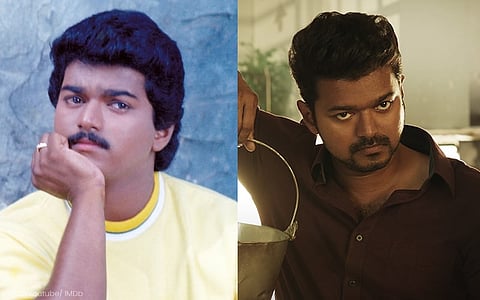
- Reviews
- Power List 2024
- Cannes 2024
- In-Depth Stories
- Web Stories
- News
- FC Lists
- Interviews
- Features
- FC SpecialsFC Specials

The craze for Master is understandable. We haven't been to the theatres in almost a year, plus this is the big-star movie to beat all big-star movies. And yet, to see those videos of people climbing on their friends' shoulders to get near a ticket counter, with no concept of social distancing and without wearing masks… it is a little scary.
And to think that, at one point, Vijay wasn't this Vijay. Very few leading men become overnight stars like Hrithik Roshan, and going through Vijay's Wiki page is a reminder that he had a particularly underwhelming beginning. In the early stages, apart from the odd Rajavin Parvayile (directed by Janaki Sounder) or Chandralekha (Nambirajan), it was mostly a series of films made by his father, SA Chandrasekhar (Naalaya Theerpu, Sendhoorapandi, Rasigan, Deva, Vishnu). Even die-hard Vijay fans—the kind who'd risk a COVID infection rather than miss an FDFS—may have trouble remembering these low-budget productions, which were mostly flops, with a mid-range hit here and there.
Vijay needed that one big success, and he got that in 1996. His first release that year was C Ranganathan's Coimbatore Mappillai (best remembered today for being the movie that gave us "shroov"). Then, on February 15, he got that star-making success, with Vikraman's Poove Unakkaga. In a June 2020 interview to Indiaglitz, the director said Vijay was not the unanimous choice as the leading man. Hum Aapke Hain Koun..! was the trend-setting blockbuster of the time, and Vikraman wanted to make a "homely love story" along those lines. He'd seen Vijay in a song on a television music channel, and he liked what he saw. But the producer (RB Choudary, of Super Good Films) and many others, apparently, were not convinced. Vijay did not have the "family audience" image. Would he work in a family-friendly movie?
But Vikraman stuck to his conviction, and the rest, as they say, is his(kutti)story. I watched Poove Unakkaga for this piece, and it's hard to reconcile the image of that-era Vijay with the mega-star we know today. In Poove Unakkaga, he has the Murali Role™: he's someone who pines for a woman and doesn't get her and decides to stay single. A card at the end tells us that this isn't frustration. He just wants to live with the memories of his one-sided-love. What do you say! It's a nineties' thing, and like many nineties' films, Poove Unakkaga has dated very badly.
https://youtube.com/watch?v=QKXruh2EhhY
And yet, from the perspective of pop-culture history, it's fun to see a very "normal" Vijay, a young man looking for a job, a young man we see on the 18S bus, a young man who's a "soft romantic hero" who hums Tujhe dekha to yeh jaana sanam, from Dilwale Dulhania Le Jayenge. His character (named Raja) wants to reunite two warring families (one of them is Christian, the other Hindu), and these efforts are laughably written. Looking at Poove Unakkaga, you see the roots of the modern-day TV serial. One character actually pours poison over a box of sweets Raja brings, because death is preferable to eating something from Raja's hands. To the bad romance, the bad drama, you can add bad comedy. While bathing in the river, Tamil cinema's eternal "friend", Charlie, invents something called "sudhandhira kuliyal". He even translates it: "freedom bath". So he and Vijay remove their undies and toss them onto a distant shore, and the heroine (Sangita) runs away with their clothes, and they end up walking home in grass skirts.
The interval twist is moderately involving, but as I said, the real "twist" in the film—seen through today's eyes—is watching a very different Vijay. He doesn't get a fight sequence. He doesn't even get a proper "intro". This Vijay, of course, could have never lasted (even if he would have a bigger "soft hero" blockbuster a few years later, in Kadhalukku Mariyadhai)—because at least in Tamil cinema, there's no history of a "soft hero" becoming a "mass" star. Even here, when Charlie says he is a "Kamal fan", he points to Vijay as a "Rajini fan". The "image" is already being built, because that's where the real mega-bucks stardom lies. And once we get to Ghilli (2004), there's really no looking back. Vijay had become the… Mass-ter!